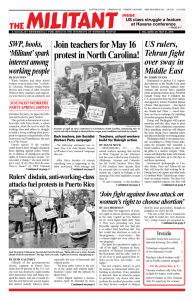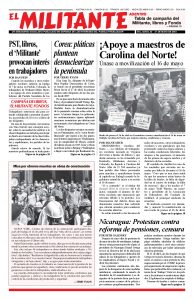Determined to protect U.S. imperialist interests in the Middle East, push back Tehran’s growing military interventions and prevent Iran’s capitalist rulers acquiring nuclear arms, President Donald Trump May 8 withdrew the U.S. government from the 2015 nuclear deal signed by former President Barack Obama. That agreement — also signed by the rulers in Germany, France, Britain, Russia and China — eased sanctions on Iran in exchange for curtailing its nuclear program through 2030.
Trump said Washington will impose sanctions and take other steps to press Tehran to make additional concessions. More punishing sanctions will sharpen the crisis facing Iran’s capitalist rulers and fall most harshly on working people.
Washington holds a vast nuclear arsenal. According to a White House statement, the president will “assemble a broad coalition of nations to deny Iran all paths to a nuclear weapon.” Businesses and banks that trade with Iranian companies will have up to 180 days to end these operations.
Government spokespeople in London, Berlin, Paris and Tehran all say they will keep the deal working by allowing Iran’s oil exports and other trade to continue while Tehran keeps restrictions on nuclear activity. The three European capitalist regimes say they will “defend the more than €20bn of trade [$23.7 billion] that now exists between the EU and Iran,” the Financial Times reported May 9, “up from €6.2bn in 2013.”
Since the pact was signed in 2015 the Iranian rulers have continued to advance their counterrevolutionary role in Syria, Lebanon, Iraq and Yemen, building on decades of military incursions across the region. The country’s capitalist rulers’ moves abroad are an extension of their efforts at home to push back the gains made by working people during the 1979 revolution that toppled the U.S.-backed shah of Iran.
Tehran’s Revolutionary Guard, along with Hezbollah and other Shiite militias, intervened in Syria to shore up the rule of the Bashar al-Assad dictatorship after it put down a popular uprising. They have been backed by Moscow’s air power. As a result, Iran’s rulers have established bases across Syria, installing missile and weapons systems. Their military forces are deployed ever closer to the border of Israel.
Syrian government officials and opposition forces both report Tel Aviv carried out a missile attack against an Iranian-linked army base in al-Kiswah, eight miles south of Damascus, May 8. Nine Revolutionary Guard or Shiite militia troops were killed, reported the Syrian Observatory for Human Rights.
The Jerusalem Post said this attack came after “it became known,” that Hezbollah and Revolutionary Guard forces were planning a missile attack on Israel.
After a missile strike that killed seven Iranian troops in early April, senior Iranian cleric Ali Shirazi threatened “to turn Tel Aviv and Haifa into dust.”
But so far the Iranian rulers have not retaliated. They remain wary about the impact at home of the bloody outcome of more clashes with Israel. For years the capitalist rulers have offered inducements to Afghans and other refugees to serve as cannon fodder in their wars in Syria and Iraq. They hope to lessen the number of Iranian casualties and quell opposition to their murderous conflicts.
But widespread discontent with the impact of their wars drove working-class protests throughout Iran in late December and early January. Since then, strikes by steel, rail and hospital workers and teachers were reported in the Wall Street Journal. Workers were enraged when the government’s budget was revealed in December 2017, showing huge funds for wars while workers face cutbacks.
Iranian President Hassan Rouhani said Tehran would try to maintain the agreement with the pact’s other signatories. He reiterated that the country’s rulers have no intention of relinquishing their “influence in the region.” Moscow says that if Washington resumes sanctions it would expand trade with Iran.
Washington: Biggest military force in Mideast
The U.S. rulers have the largest military force in the Mideast, with 2,000 troops in Syria and massive reserves, air power and naval patrols throughout the area. And they are getting their allies in the region to do more. The Saudi Arabian monarchy says it will send troops to be part of a joint-Arab force in Syria. The rulers in Egypt say they also may join in. U.S. troops are in land controlled by the Kurdish-led Syrian Democratic Forces, some 25 percent of the country.
As the same time the U.S. rulers are seeking to broker a deal between Tel Aviv and Palestinian leaders. The new U.S. Embassy is due to open May 14 in Jerusalem. U.S. officials denied reports by Israeli Defense Minister Avigdor Liberman that they had asked the Israeli government to withdraw its forces from four neighborhoods in east Jerusalem so a future Palestinian capital could be located there. But Liberman reiterated that “the U.S. Embassy in Jerusalem will come at a price and it is worth paying it.”
A Dec. 11 statement by the Socialist Workers Party — “For Recognition of a Palestinian State and of Israel” — explains that the U.S. government is “putting it to its allied regimes in Saudi Arabia, the Gulf States, Egypt and Jordan, as well as to the bourgeois misleaders of the Palestinian Authority and Hamas, that Washington is ‘making them an offer they can’t refuse.’” It adds that the U.S. rulers are “combining the stick of an anticipated U.S. Embassy in Jerusalem with the carrot of greater economic and military aid to Sunni-led governments against their feared rival in Shia-led Tehran.”
The starting point, the SWP statement says, has to be “the class interests and solidarity of workers and toiling farmers across the Middle East — be they Palestinian, Jewish, Arab, Kurdish, Turkish, Persian or otherwise, and whatever their religious or other beliefs — as well as working people in the United States and around the world.”

